
French postcard by Editions Admira & Bettina Rheims, no. PHN 139, 1987. Photo: Bettina Rheims, 1985.
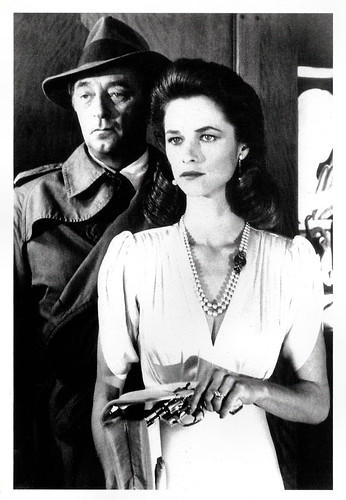
French postcard in the Les Douze de Schirmer series, no 2, by Schirmer / Mosel, 1990. Charlotte Rampling and Robert Mitchum in Farewell My Lovely (Dick Richards, 1975).

French postcard by Cart a Pub / Festival du Film de Paris, in the series Les plus belles jambes du cinéma, 2001. Photo: André Rau.
A traumatic event
Charlotte Rampling was born Tessa Charlotte Rampling in Sturmer, Great Britain, in 1946. She is the daughter of Anne Isabelle Rampling-Gurteen, a painter, and Godfrey Rampling, an army officer. Her father had won silver in the athletics track event 4x400m relay at the 1932 Olympics, and gold in the 4x400m relay at the 1936 Olympics.
Charlotte attended the Jeanne d'Arc Académie in Versailles, France and the exclusive St. Hilda's School, Bushey, England. At 17 she was spotted on the street and asked to appear in a Cadbury television commercial. She enjoyed a successful modelling career before she made her first, uncredited screen appearance as a water skier in the comedy The Knack ...and How to Get It (Richard Lester, 1965). The film won the Palme d'Or at the 1965 Cannes Film Festival and was nominated for the Golden Bear at the 15th Berlin International Film Festival.
Later that year she played the female lead in the comedy Rotten to the Core (John Boulting, 1965) with Anton Rodgers and Eric Sykes. At the time London was swinging and the 20-year-old Rampling was one of the city’s ‘it’ girls. She played Meredith, the bitchy but beautiful roommate of Georgy (Lynn Redgrave) in the successful comedy-drama Georgy Girl (Silvio Narizzano, 1966).
But that year, a traumatic event occurred, when her elder sister Sarah shot herself in Argentina after giving birth prematurely and losing her child. Charlotte was devastated by this loss, which she experienced as an abandonment by her sister. She and her father lied to her mother, telling her that Sarah had died of a stroke. Charlotte seemingly overcame this trauma and was able to continue acting.
In 1967 she played the gunfighter Hana Wilde in The Superlative Seven, an episode of the hit series The Avengers with Patrick Macnee. After this, her acting career blossomed in both English and French cinema. Among the early roles were the female lead in the British adventure film The Long Duel (Ken Annakin, 1967) starring Yul Brynner and Trevor Howard, and the thriller Target: Harry (Roger Corman, 1969).
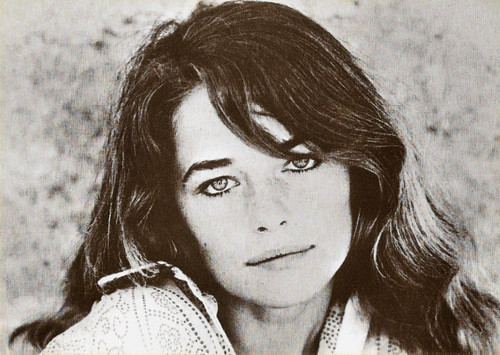
French postcard by Travelling Editions, Paris, no. CP 116.

French postcard by L'aventure carto, 2003, in the series Portraits de Stars - Acteurs étrangères, no. 15. Photo: Marcel Thomas.

Romanian postcard by Casa Filmului Acin, no. 520.
Mysterious, sensitive and ultimately tragic
Charlotte Rampling has performed controversial roles. In Luchino Visconti's classic, she played a young wife sent to a Nazi concentration camp. Critics praised her performance, and it cast her in a whole new image: mysterious, sensitive and ultimately tragic. ‘The Look’ as co-star Dirk Bogarde called it, became her trademark.
She played Anne Boleyn in the film adaptation of Henry VIII and His Six Wives (Waris Hussein, 1972), with Keith Michell as Henry VIII. In the US, she played the wife of Robert Blake in the drama Corky (Leonard Horn, 1972). In 1972, Rampling also married the actor and publicist Bryan Southcombe and had one child, Barnaby Southcombe (1972), now a television and film director. They were widely reported to be living in a ménage à trois with a male model, Randall Laurence, although Rampling always denied there was ever any sexual relationship.
She co-starred with Sean Connery in the Science-Fiction/fantasy film Zardoz (John Boorman, 1974). In Il Portiere di notte/The Night Porter (Liliana Cavani, 1974), she portrayed a concentration camp survivor who is reunited with the Nazi guard (Dirk Bogarde) who tortured her and resumes their ambiguous relationship.
In France, she offered a passionate rendering of a violent heiress confined to a mental institution in La Chair de l'orchidée/The Flesh of the Orchid (1975), an adaptation of the pulp novel 'The Flesh of the Orchid' (1948) by James Hadley Chase. The film was the directorial debut of French author and stage director Patrice Chéreau and also stars Simone Signoret, Bruno Cremer and Edwige Feuillère. Other interesting European films were Un taxi mauve/The Purple Taxi (Yves Boisset, 1977) with Peter Ustinov, Philippe Noiret and Fred Astaire, and Max mon amour/Max, My Love (Nagisa Oshima, 1986), in which she played a woman who fell in love with a chimpanzee.
Rampling gained recognition from American audiences in a remake of Raymond Chandler's detective story Farewell, My Lovely (Dirk Richards, 1975) with Robert Mitchum as Philip Marlowe. Later she stole the show with her part in Stardust Memories (Woody Allen, 1980) as a beautiful but emotionally fragile depressive. She had again success in Hollywood as the deceitful Laura in the acclaimed courtroom drama The Verdict (Sidney Lumet, 1982), starring Paul Newman. Five years later she appeared with Mickey Rourke and Robert De Niro. in the American voodoo-themed thriller Angel Heart (Alan Parker, 1987), as an ill-fated woman whose heart is irrevocably extracted from her body.
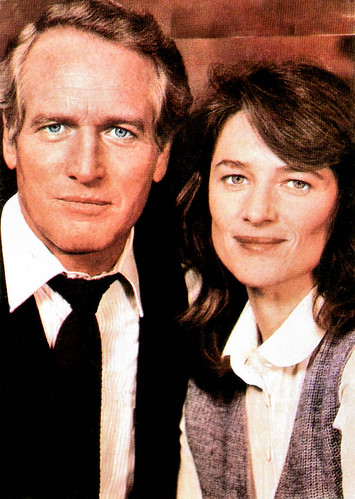
Romanian postcard by Casa Filmului Acin, no. 43079. Photo: publicity still for The Verdict (Sidney Lumet, 1982) with Paul Newman.

French postcard by Humour à la Carte, Paris, no. A-C 1261. Photo: Gaumont. Charlotte Rampling and Mickey Rourke in Angel Heart (Alan Parker, 1987).

Spanish postcard by Productas Compactos S.A. Sent by mail in 1993.
A commanding, devastating, and nuanced performance
In the following decade, Charlotte Rampling mainly worked for TV, such as in Great Expectations (Julian Jarrold, 1999), BBC's BAFTA award-winning adaptation of the Charles Dickens novel. She played the decayed spinster Miss Havisham opposite Ioan Gruffudd as Pip. Charlotte Rampling credits François Ozon with drawing her back to film in the 2000s, a period when she came to terms with the death of her eldest sister Sarah. Ozon gave her the lead role in his French drama Sous le sable/Under the Sand (François Ozon, 2000), which was nominated for three César Awards and was critically well received. Bob Mastrangelo at AllMovie: “Sous le Sable belongs to Charlotte Rampling. Delivering a commanding, devastating, and nuanced performance, Rampling portrays Marie Drillon, a middle-aged professor who goes through an emotional roller coaster after the sudden disappearance of her husband. Rampling beautifully handles Marie's various transformations, making it appear outwardly as if she is coping with reality, while inwardly she is collapsing.”
The character she played in Ozon's Swimming Pool (François Ozon, 2003), Sarah Morton, was named in her sister's honour. For most of Rampling's life, she would say only that her sister had died of a brain haemorrhage; when she and her father heard the news, they agreed they would never let her mother know the truth. They kept their secret until Rampling's mother died in 2001. A year later, Rampling became a Dame of France's Legion. At 59, Rampling appeared in Vers le Sud/Heading South (Laurent Cantet, 2005), a film about sexual tourism. She plays Ellen, a professor of French literature and single Englishwoman, who holidays in 1970s Haiti to get the sexual attention she does not get at home. Ozon directed her also in the costume drama Angel (François Ozon, 2007). Furthermore, she portrayed the mother of Keira Knightley's character in The Duchess (Saul Dibb, 2008), and she appeared in the terrorist thriller Cleanskin (Hadi Hajaig, 2010), starring Sean Bean and James Fox. Very interesting is the Polish-Swedish co-production The Mill and the Cross (Lech Majewski, 2011) starring Rutger Hauer as Pieter Bruegel the Elder, on whose 1564 painting 'The Procession to Calvary' the film is inspired. She was also among the cast of Lars von Trier’s Melancholia (2011) starring Kirsten Dunst and Charlotte Gainsbourg.
Charlotte Rampling played the title role in the noir thriller I, Anna (2012) written and directed by her son, Barnaby Southcombe. Rampling married twice. In 1976, she met French composer Jean Michel Jarre at a dinner party; and left her first husband Bryan Southcombe the next day. Two years later she married Jarre and had a second son, magician and singer David Jarre. During 20 years, she accompanied Jarre on his worldwide music and light shows. She also brought up stepdaughter Émilie Jarre, now a fashion designer. Then the marriage was publicly dissolved in 1997 when she learned from tabloid newspaper stories about Jarre's affairs with other women and had a nervous breakdown. Since 1998, she has been engaged to Jean-Noël Tassez, a French communications tycoon.
In 2013 she played Dr. Evelyn Vogel in the American hit series Dexter, had a small part in Night Train to Lisbon (Bille August, 2013) and she appeared in Francois Ozon’s Jeune & jolie/Young & Beautiful (2013). In 2012 she was nominated for a Primetime Emmy Award and a Screen Actors Guild Award, both for her performance in the miniseries Restless (Edward Hall, 2012). For her performance in the film 45 Years (Edward Haigh, 2015), she won the Berlin Film Festival Award for Best Actress, the European Film Award for Best Actress, and was nominated for the Academy Award for Best Actress. In 2017, she won the Volpi Cup for Best Actress at the 74th Venice International Film Festival for Hannah (Andrea Pallaoror, 2017).
Rampling received an Honorary César in 2001 and France's Legion of Honour in 2002. She was made an OBE in 2000 for her services to the arts and received the 2015 Lifetime Achievement Award from the European Film Awards. In 2015, she released her autobiography, which she wrote in French, titled 'Qui Je Suis'. She later worked on an English translation, 'Who I Am', which was published in 2017. Charlotte Rampling stays very active on the screen. Recently, she appeared in the films Benedetta (Paul Verhoeven, 2021), Dune (Denis Villeneuve film, 2021) and Juniper (Matthew J. Saville, 2021).

Small German collectors card. Charlotte Rampling in Hammers Over The Anvil (Ann Turner, 1993).
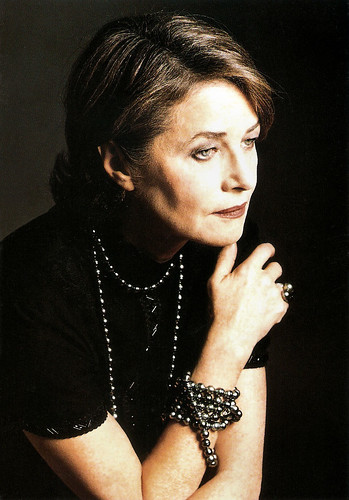
French postcard by Équilibres et populations, Paris, in the series "Stars en Perles de Tahiti", 2003. Photo: Jean-Daniel Lorieux.

Belgian postcard by Boomerang.be, 2006. Photo: Cinélibre. Charlotte Rampling in Vers le Sud/Heading South (Laurent Cantet, 2005).
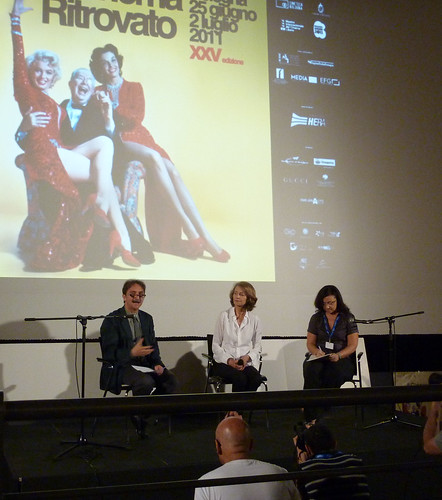
Charlotte Rampling is interviewed by Gian Luca Farinelli before the screening of The Damned in Cinema Jolly at the Cinema Ritrovato 2011 festival in Bologna, Italy. 27 June 2011.
Sources: Tracie Cooper (AllMovie), Bob Mastrangelo (AllMovie), Sholto Byrnes (The Independent), Pete Stampede, David K. Smith and Alan Hayes (The Avengers Forever), Wikipedia, and IMDb.
What an amazing career. I like that she is continuing to work hard and appear in so many international productions.
ReplyDeleteAn when I photographed her in Bologna, she was mesmerizing.
ReplyDelete"aspecto aristocratico" blogspot
ReplyDelete